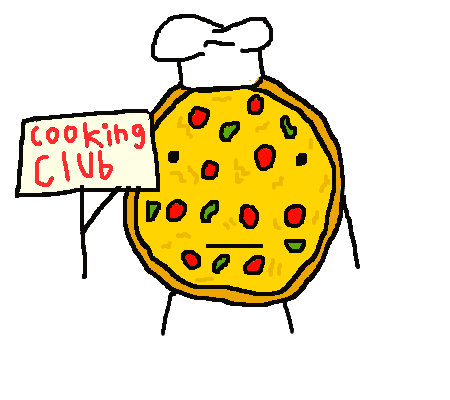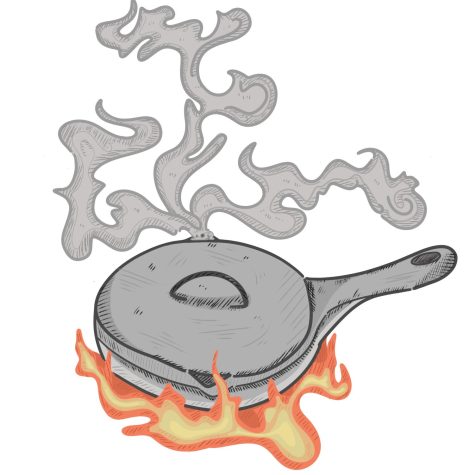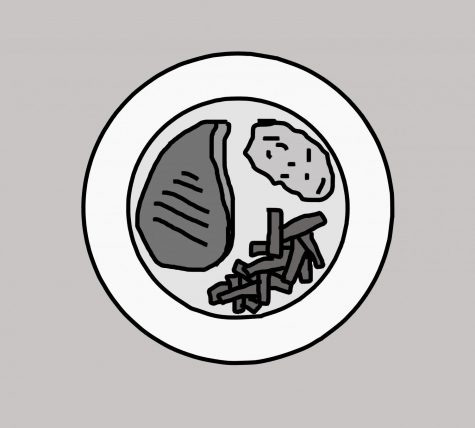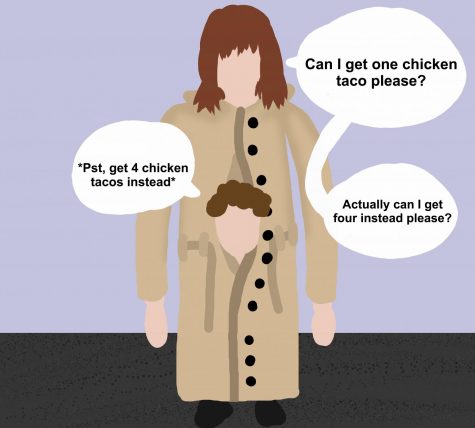Are Vegans Smug Enough?
November 12, 2015
Veganism has, for some time now, been a cultural punchline. Though the consensus is that the animal-omitting diet renders these herbivores humorless and bland as the protein they consume, it’s both easy and fun to point at these strange creatures and giggle. Anthony Bourdain describes vegans as the “Hezbollah-like splinter faction” of vegetarianism. Burnie Burns of the Rooster Teeth Podcast strikes a similar note when he argues the quickest and surest route to militancy in the United States is veganism. Alan Richman describes the community help board in a vegan restaurant as “offering assistance with the essentials of life, such as channeling, massage, and meditation, and a lot of notices promising rewards for the return of lost animals. Vegans seem to lose more than their share of cats.”
Did I chuckle when I read and listened to these humorous descriptions? Did I contribute to the problem by describing their protein as bland with an unnecessary metaphorical flourish? Absolutely. There’s something about the evangelizing smugness of the generic vegan that lends them to mockery. Richman’s subtle innuendo that vegans lose their house pets because they’re feeding them vegan pet food is worth a chuckle. Oh, those foolish vegans, when will they learn?
But the question we never seem to ask ourselves is this: Are vegans convincing enough? Are vegans doing enough to convert us? By now it’s common knowledge that industrialized farming is not good for the environment. The old adage is that it’s better for the planet to eat veggie burgers in Hummers than cheeseburgers in Priuses. Consumption is a political act – voting isn’t the only way we express our hopes for the future.
But vegans have a real role, beyond leading by example. Vegans can and should jostle us out of our comfortable, epicurean routines. Tell us how much methane the beef industry produces. Enunciate the anguish of chickens, crowded together in dark warehouses and fattened on feed. Decry the plight of the workers, the farmers whose livelihoods lie at the whim of corporations like Tyson. Make us uncomfortable about our choices.
Should every single human being convert to veganism tomorrow, 6:00 a.m. sharp in time for morning yoga? Of course not. I eat too much Greek yogurt and honey to make any such demands. But it’s time to start thinking about our diets differently. My food philosophy could never deprive another human being of a food they enjoy (except perhaps human flesh), but if you truly enjoy something, you do not eat it all the time. When something is ubiquitous, we take it for granted and stop esteeming it.
For example, my favorite dessert is zabaione, a rich, chilled custard made with egg whites and marsala. I eat it once a year, perhaps once every two. To eat it more frequently would make it less special. I would appreciate it less. I’m not saying you must limit your lamb chop consumption until the next election cycle, but make your meat remarkable. It’s too ubiquitous now, and that needs to change.
What are you willing to give up for the sake of the planet? Surely you would choose a wheat protein cutlet over permanent resettlement on Mars…wouldn’t you? Not all change will come from a carbon tax.
The first step in changing our ways is to listen. We shouldn’t dismiss vegans so quickly. Don’t let the persona of the vegan stereotype dressed in an organic hemp sweater distract you from their message. The issues are important enough to overcome your inherent aversion to smug dogma. Instead, let your local vegan have their soapbox, and maybe even listen. After you help them find their escaped feline, you can perhaps learn something.











Smug Vegan • Nov 12, 2015 at 5:52 pm
I should add that, while learning about the arguments supporting veganism, one should learn about vegan dietetics. It’s easy to get whatever nutrients one needs on a vegan diet, including mega doses of protein if you want, but do the research to do vegan right. There are too many people who don’t learn and end up blaming vegan diets instead of placing the blame where it belongs: their particular diet(s) or ignorance.
Robert Grillo • Nov 12, 2015 at 5:45 pm
I’m far more concerned with the smugness of the dominant culture who still believes in the archaic myths of human supremacy and dominion, who are still essentially living in the dark ages, quite smugly, when it comes to other animals.
Smug Vegan • Nov 12, 2015 at 5:43 pm
As a smug, self righteous, sanctimonious, holier-than-thou vegan who has refused to exploit animals for more than 12 years now, I agree that people should listen to vegans. However, it’s not the responsibility of vegans to even try to persuade people to be vegan, much less to actually persuade them. It’s the responsibility of anyone with a conscience to learn about the issues and persuade oneself to be vegan.
Rama Ganesan • Nov 12, 2015 at 3:37 pm
Thank for this article. If all the animal foods you consume are Greek yogurt and honey, you can transition to veganism pretty easily. I also used to love those foods before I went vegan, especially in combination! But once I learned about the unfairness of dairy farming and honey farming, I switched to plant milks and agave syrup. Easy.
We do indeed talk about the effect of animal farming on the climate, and refer everyone to watch Cowspiracy, available now on NetFlix. My friends who have seen it find it very compelling.
Since I researched and understood animal agriculture, and then animal rights, I don’t feel smug, I feel very sad and hopeless. There is enormous cruelty that keeps me awake at nights, doesn’t allow me one moment of peace. In general I would say that any group of people who have a grievance do not always conduct themselves in a dignified manner — the injustice is too great.
Perhaps the smugness you see is just a defense mechanism for vegans — a wall to stop feeling the injustice of 70 billion land animals killed unnecessarily for human food every year. Once we include another 70 billion sea animals, and the bycatch, the numbers are too vast to be comprehensible. The world is a harsh place when you have vegan sensibilities.
Is reducing your consumption of animal foods enough? It’s better than nothing. But once you decide to see other animals for what they are, beings with rights just like you or me, then it does not seem fair even to breed one chicken to breed so many eggs that it kills her. Not fair to take away even one calf so that we can take his milk.
So, along with other activists, I say, not only go vegan, but become an animal activist. Join us.